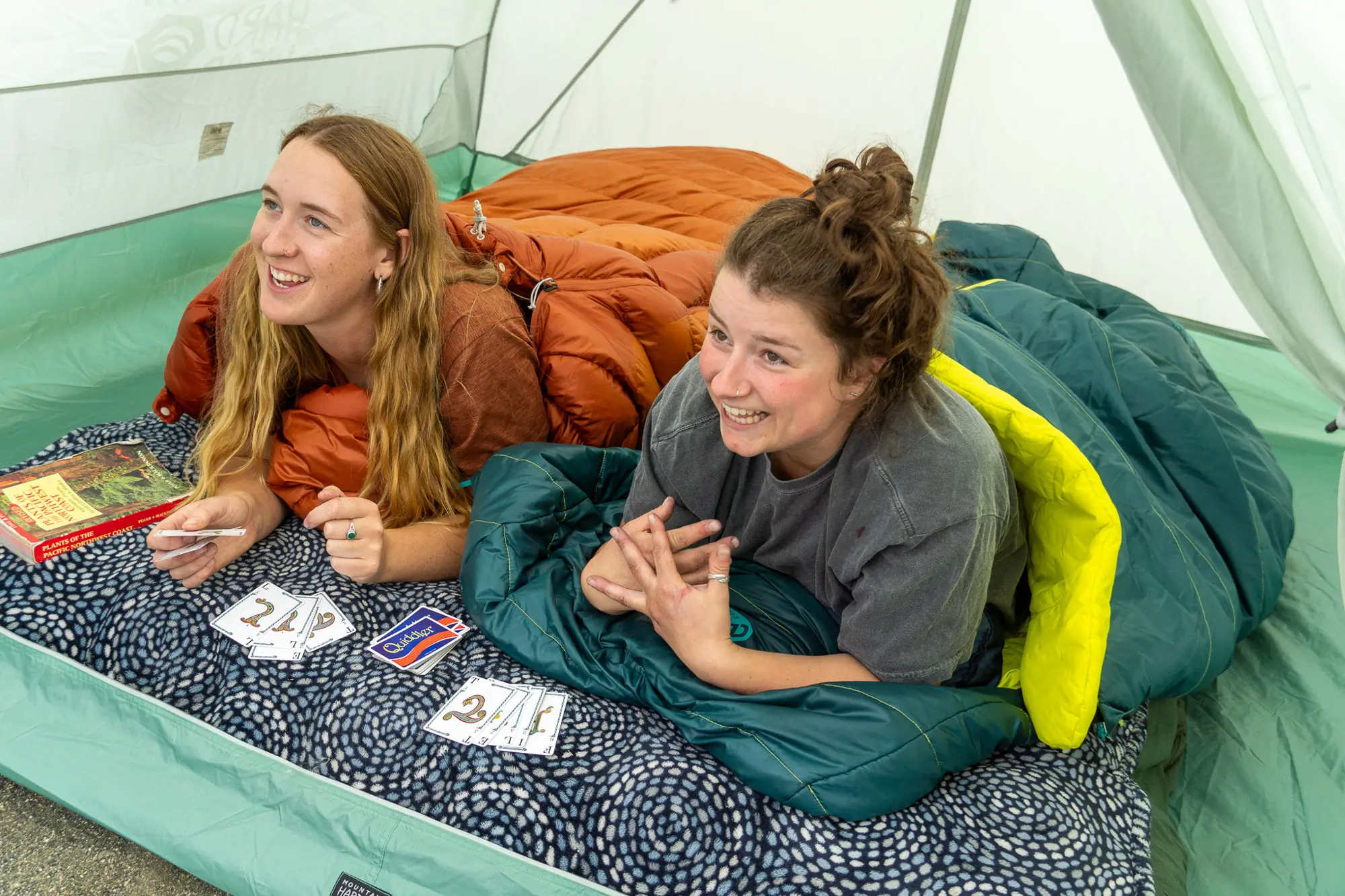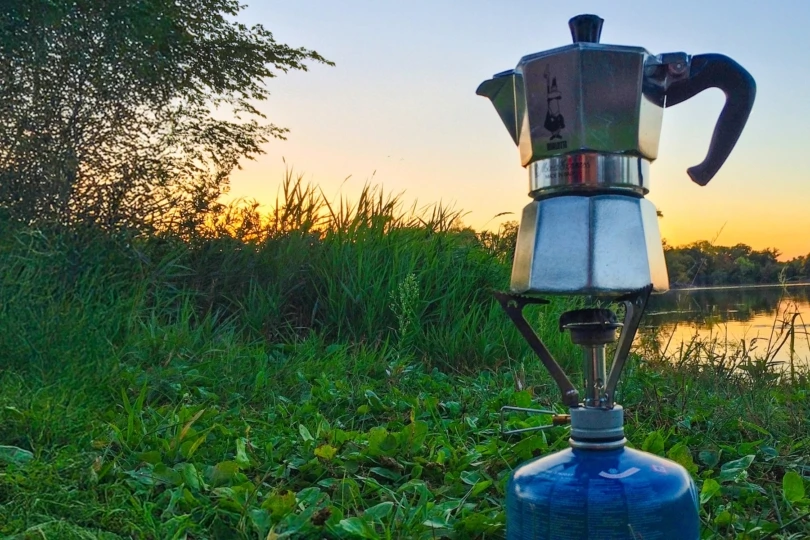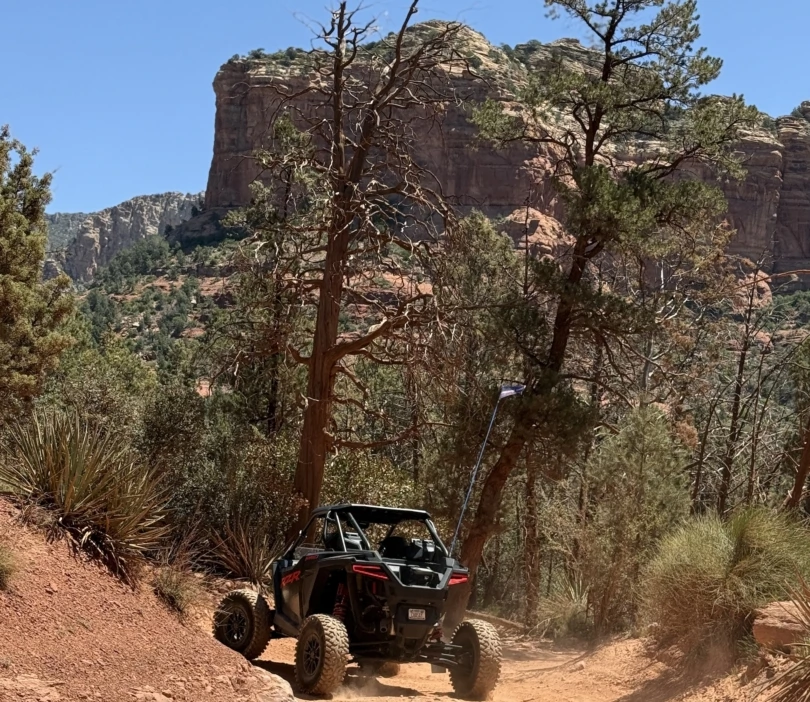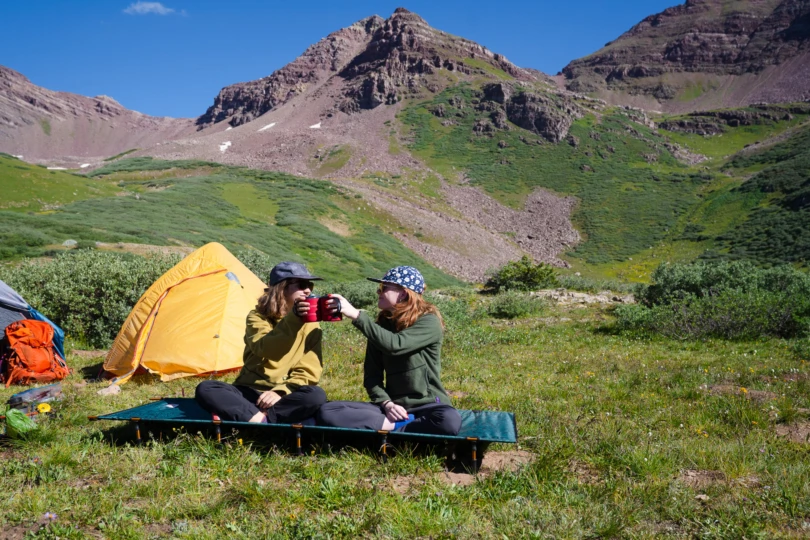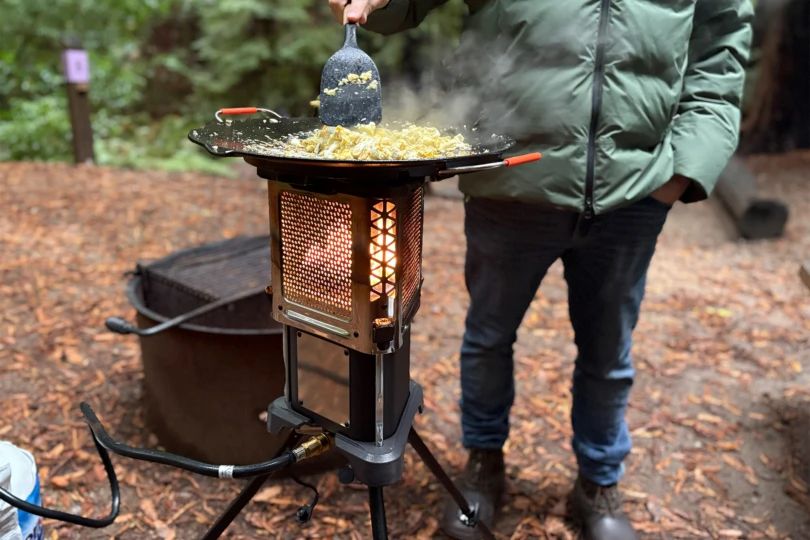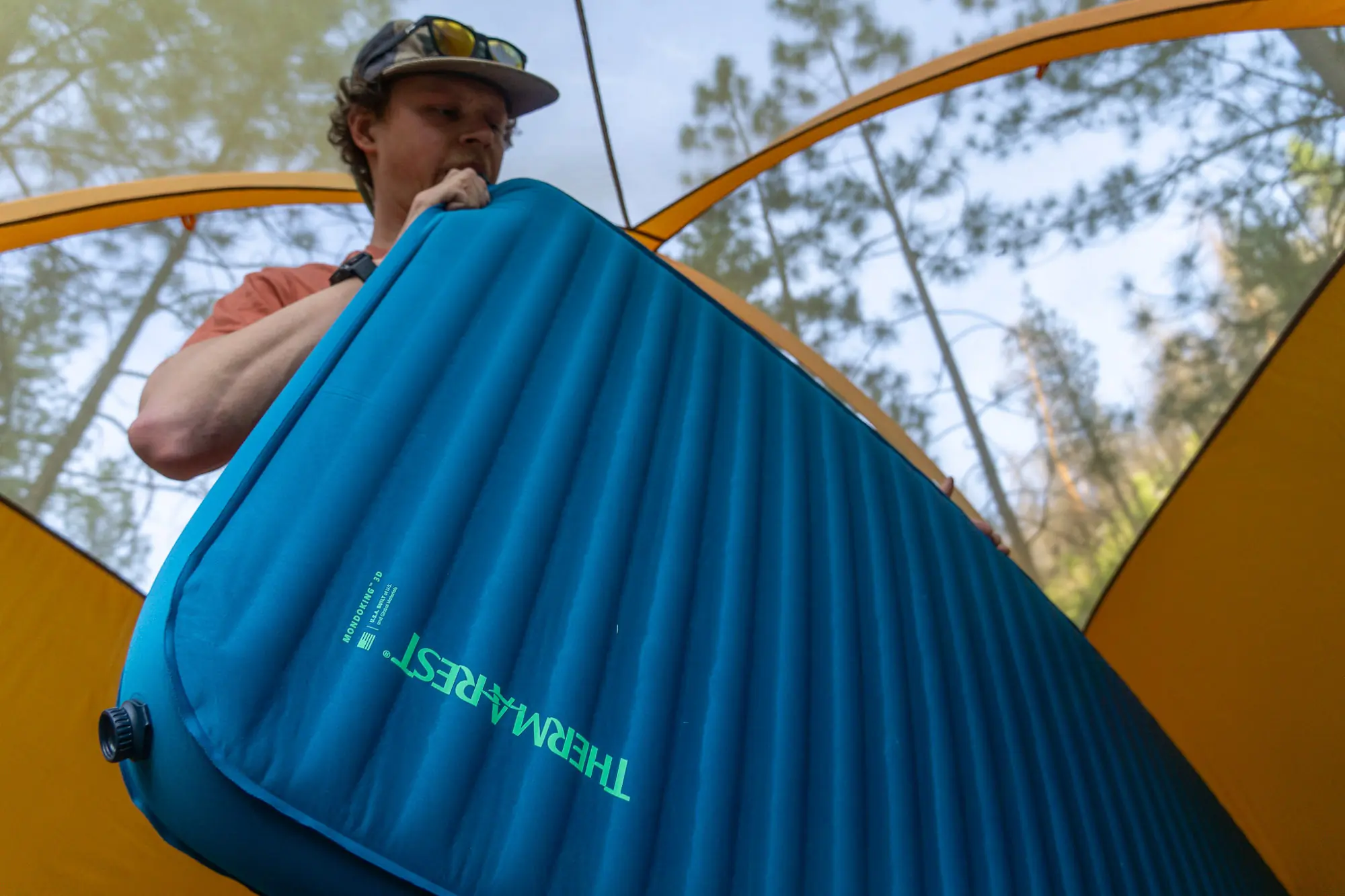Whether you’re taking the kids out for a weekend in nature or looking for a solo escape from the city, we’ve got the complete guide to camping for beginners right here.
No more second-guessing if you’ve left something essential at home or whether there will be enough TP at the campsite. Here, we cover everything you need to put in the vehicle as you get ready to leave town for a relaxing getaway — and what to do with it all when you get to camp.
Camping at a drive-in campsite makes packing easier than backpacking or being in the backcountry. You don’t need to worry about weight or carrying everything on your back. So bring a few more luxuries and make the most of your camping experience!
And remember to check out our Camping Gear Checklist for a full rundown of everything you’ll need.
Before you go camping anywhere, you need to know what to bring. Having a checklist can save you hours of research and a little bit of planning. This post is intended to be used by car campers that have limited outdoor experience. So if this is your first time camping, this is the list for you.
Camp Gear for Beginners
Tent
A camping tent is a home away from home in the great outdoors. It will keep you warm and dry if rain or snow is in the forecast. The two biggest things to keep in mind are the weather and how big you want your tent.
A three-season tent is always a safe choice, and the capacity will depend on your personal preference. You can find the perfect tent for you in our best camping tents roundup.
Some tents come with a footprint to protect the tent floor from the ground, keeping the interior nice and dry. If your tent doesn’t have one, use a tarp.
And even expensive tents can have some chintzy stakes. Before leaving, check the stakes to ensure quality and strength. When car camping, bring a rubber mallet to make securing the tent and tarp corners a breeze.
Sleeping Pad & Bag
One of the biggest worries people have when getting ready for their first camping trip is whether or not they’ll be able to sleep. A sleeping pad or air mattress is the secret to snoozing all night.
When it comes to camping for beginners, we recommend air mattresses or sleeping pads with an air pump. This will lift you off the ground and add insulation during colder nights. Check out our annual list of the best sleeping pads for some recommendations.
Another essential item for a good night’s sleep is your sleeping bag. Whether you decide to go with synthetic or down fill, check that the comfort rating will be appropriate for the weather conditions. For example, if you think that low for the night might be 25 degrees Fahrenheit, a 22-degree bag (or lower) is the right choice.
Pillow
A pillow is a camping luxury, but if you aren’t backpacking, you should enjoy it! There are plenty of inflatable camping pillows to choose from. But honestly, if you’re driving to the campsite, nothing beats your favorite pillow from home.
Beginner tip: Set your tent and sleep system upright when you get to camp. Setting up a tent, blowing up an air mattress, and situating your sleeping bag takes much longer when it’s dark. Also, if you’ve never set up a tent before, practice at home before your trip.
Toiletries
Towel
Many campgrounds have communal showers, which makes it easy to stay clean. However, if you’re dry camping, this will not be an option.
Either way, leave your bathroom towels at home and get a microfiber travel towel instead. They are easy to compress into a duffel bag or daypack and will dry quickly when hung in a tree or on the clothesline.
Toilet Paper
Bring toilet paper! Even if the campsite advertises full amenities, you’ll never regret having your own.
Additionally, each person should bring a small bag with the hygiene essentials they need for a weekend, such as prescription medications, travel toothpaste and toothbrush, a small comb or brush, a travel-size shampoo bottle (or bar), lip balm, and menstrual items.
Sun & Bug Protection
When camping, you’re often exposed to the sun all day. You should be wearing sunblock, even if the forecast calls for overcast skies. Depending on the season and location of your camping trip, bug spray is a worthwhile investment as well.
First-Aid Kit
You’ll only need one first-aid kit for your entire group. While serious injuries are less likely, slivers and minor scrapes are pretty common. Especially if you have adventurous kids!
Pack basics like bandages, gauze, tweezers, and OTC medications such as ibuprofen and antihistamines.

Camp Accessories
Lighting
A few lighting options are good to have. An inexpensive headlamp or flashlight is essential when you’re looking for things in your tent after dark — or taking a midnight walk to the bathrooms.
Try some rechargeable lanterns, like the solar-powered inflatable Luci lantern, around camp for dinner or family game time.
Camp Chairs & Table
Beyond lighting, don’t forget to pack a few chairs and a table. Some campgrounds will provide picnic tables, but you can’t sit around the fire at a picnic table.
Camp chairs are usually made of durable nylon material, making them light, foldable, and easy to move around. They’re great for relaxing at the campsite and can be moved to shade, sunlight, or to gather around the campfire at night.
Even if your campsite has a picnic table, a lightweight folding table adds some valuable surface space for food and drinks. We’ve reviewed a few of our favorite camping tables here.
Dress Appropriately for the Weather
Knowing the climate and weather of an area will influence your clothing choices. However, there are a few general guidelines to follow when it comes to outdoor clothing.
Don’t wear cotton clothing. Opt for synthetic or wool fabrics, as cotton holds moisture and doesn’t insulate well.
For beginners, camping clothes may look like your normal activewear. However, a set of long thermal pants and a matching top made specifically for camping will keep you cozy in your tent all night long. Having specific clothes for sleeping will help keep your sleeping bag clean.
Like your sleep layers, having thick socks will keep your feet warm in your tent and around camp.
Bring clothing that’s easy to layer. A down or synthetic puffy jacket makes getting out of your tent on a chilly morning much easier. This jacket may be bulkier to pack, but it’s meant to keep you warm when you aren’t moving around.
This rundown is specifically meant to cover everything you need to go camping as a beginner. But while you’re out there, you’ll probably want to enjoy a day hike on the nearby trails. Make sure you bring along some loose-fit hiking pants, one or two athletic tops, a waterproof jacket, and hiking boots or shoes.
Also remember, you’re outside, so be prepared for your clothes to get a little dirty. The good news is that with car camping, space and weight aren’t big issues. Bring enough clothing so that you’re comfortable no matter the weather.
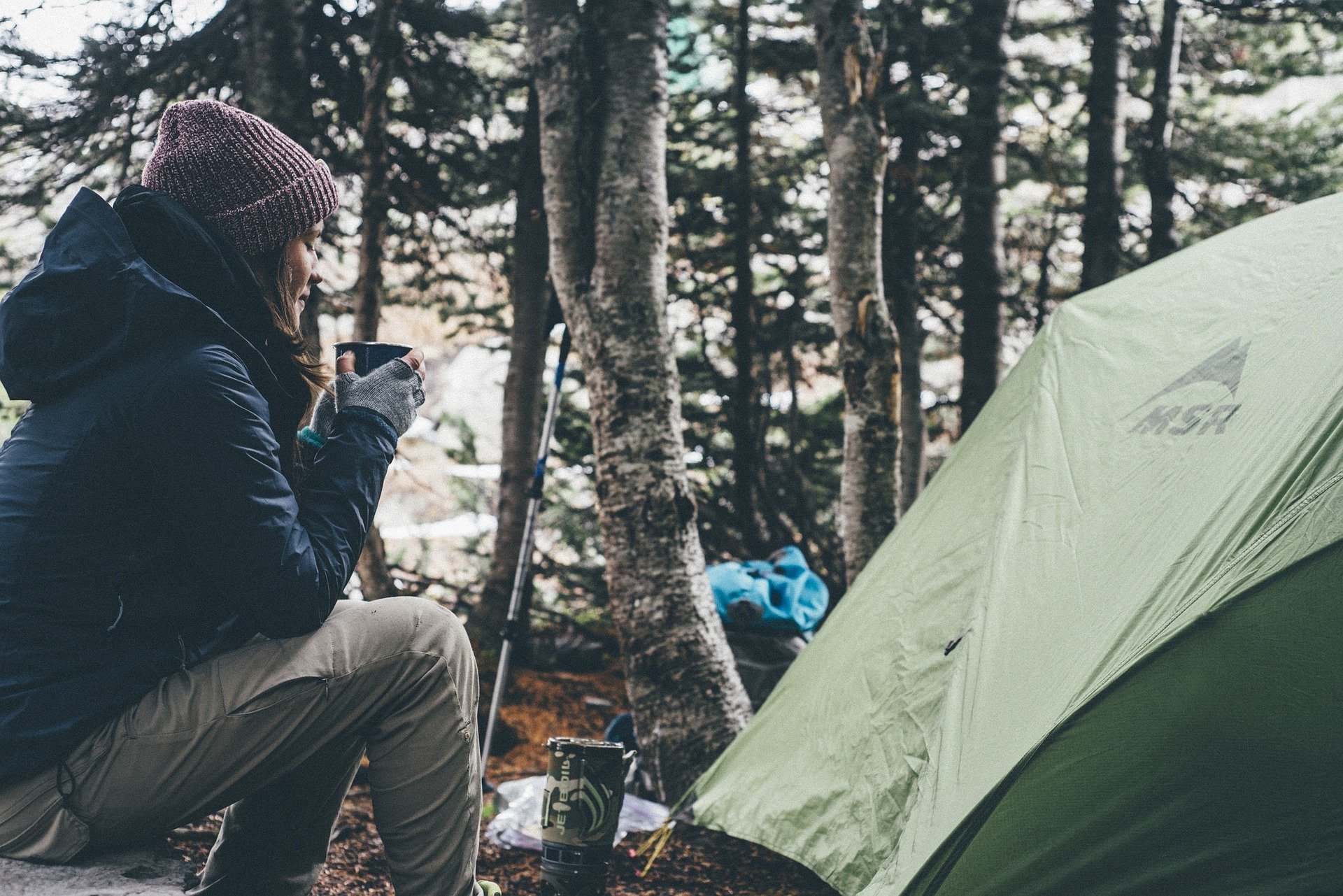
Plan All Your Meals
Camp food doesn’t have to be boring, but keeping the food prep basic makes cooking and cleaning up much easier.
Make a basic meal plan before grocery shopping for your trip. Then, prep some of the food before you leave. Do things like chop onions and peppers ahead of time or sticking to canned food to save time and hassle.
Water
Make sure you bring enough water to drink, cook, and wash dishes. Usually, if you’re in a campground, it will have water on sight. You may want individual coolers with spigots for your water and a top-opening cooler for your food and ice.
Stove
And while cooking over a campfire sounds idyllic, a portable stove is a practical choice to have when it comes to preparing all your meals. You can go with a smaller, backpacking-style stove. But we prefer to use the Coleman Classic Stove, which comfortably sits on a tailgate or table. Save s’mores for the campfire cooking.
Make sure to pack enough propane to last the entire camping trip. Double-check that the attachment is also compatible with your stove. Check out our best camping stoves roundup for more options.
Coffee(!)
If you’re a camping beginner, you may not instantly think of coffee. But waking up to the smell of a hot cuppa joe is pure bliss. Keep it simple with a stovetop kettle, French press, or just some pour-over filters.
Dishes
Don’t forget cutlery and dishes. A sturdy set of metal, enamel, or plastic dishes will reduce your waste. Get one set per person for your camping trip, plus a few for extra communal dishes or leftovers. Keep a clean, sharp knife specifically for cooking and stash a cutting board in your kitchen supplies for meal prep.
To make post-meal cleanup even easier, you can bring along two medium-sized tubs. Put the warm, soapy water in the first one for washing and have a second with clean water for rinsing.
Use eco-friendly soap and make sure to dump the dirty water in approved places. A microfiber wash towel (or two) makes it easy to wash and dry dishes and keep your table clean.
Beginner tip: Remember to pack up all your trash each night and store it in the car or a secure garbage bin. This will help keep the area beautiful and keep any curious critters away from your campsite at night.


